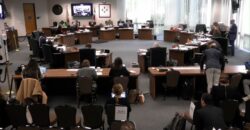Donald Trump’s Plan for Immigrants Criticized in His Own Backyard
Published Nov 16, 2024 at 3:07 PM ESTUpdated Nov 16, 2024 at 3:22 PM EST
Tom Homan Warns Migrants To ‘Self-Deport’: ‘We Know Who You Are’
Weekend Reporter
President-elect Donald Trump‘s plan to revoke the protected status of immigrants was criticized on Friday by the Miami Herald, a leading newspaper in his new home state of Florida.
During his election campaign, Trump vowed to crack down on immigration as he did in his first term as president. He said he would conduct mass deportations of the roughly 11 million undocumented immigrants currently living in the United States, citing 2022 data from the U.S. Department of Homeland Security (DHS). However, Trump has signaled that immigrants who are living in the U.S. legally under Temporary Protected Status (TPS) will also be deported.
In an early October interview with NewsNation, Trump was asked if he would revoke TPS for Haitian migrants in Springfield, Ohio, to which he said, “Absolutely. I’d revoke it, and I’d bring them back to their country.”
Trump’s comments followed claims he made on the presidential debate stage in September that Haitian immigrants in Springfield were “eating the pets.” Local authorities have repeatedly denied such claims.
Meanwhile, Trump unsuccessfully attempted to end TPS for Haitian and Nicaraguan immigrants during his first term.
Nearly a third of roughly 863,880 TPS recipients, many from Venezuela and Haiti, currently reside in Florida, where Trump lives at his Mar-a-Lago estate in Palm Beach. The Herald reported that there are currently around 295,720 TPS recipients in Florida—over four times the number of recipients in April 2021.
The Herald editorial board wrote in an article titled, “Trump’s vow to deport immigrants with protected status would hurt his home state the most,” published Friday, “We understand that TPS is, by definition, supposed to be temporary. That’s fair. But in many of these countries—Haiti, certainly, and Venezuela, too—conditions are just as bad as they were or worse.”
The editorial board added: “Returning TPS recipients to their countries could put them in danger. In Florida, where TPS recipients are our neighbors and friends and relatives, we should already know that.”
Newsweek reached out to Trump’s communications director, Steven Cheung, via email for comment Saturday afternoon.
President-elect Donald Trump speaks on November 13 in Washington, D.C. Trump’s plan to revoke the protected status of immigrants was criticized by the Miami Herald, a leading newspaper in his new home state of Florida. Allison Robbert-Pool/Getty Images
What Is Temporary Protected Status?
TPS is a federal program under the DHS that allows immigrants to stay in the U.S. temporarily without fear of being detained by DHS on the basis of their immigration status.
DHS gives the following temporary conditions that would qualify a country for TPS: ongoing armed conflict, an environmental disaster or epidemic or “other extraordinary and temporary conditions.”
There are currently 16 countries that qualify for TPS.
TPS recipients also pay taxes. According to a report from 2019, they pay $4.6 billion in federal, state and local taxes each year. The report was conducted by researchers at the University of Southern California, the Center for American Progress and the National TPS Alliance.
What Will Trump’s Second Term Mean for Immigrants?
A major part of Trump’s 2024 campaign, along with his two past presidential campaigns, has been immigration. Besides mass deportations, Trump promised to bring back tough immigration policies from his first term like the Remain in Mexico program, which forced migrants to wait in Mexico while their asylum cases were heard. He also said he’d revive and expand his travel ban that originally targeted citizens from seven Muslim-majority countries.
Last Sunday, Trump announced Tom Homan, his former acting U.S. Immigration and Customs Enforcement (ICE) director, to be his “border czar.”
Homan is considered one of the architects of Trump’s controversial family separation policy, having proposed separating migrants from their children as a way to deter illegal immigration as far back as 2014. His idea was dismissed at the time, during the Obama administration, but then implemented in 2018 under Trump.
Read more
- Ex-GOP congressman warns to “assume the most sinister” about Trump’s plans
- Pete Hegseth’s Fox News colleagues react to “white supremacist” accusation
- Ex-RNC chair calls Republicans “wusses” over Trump’s Matt Gaetz nomination
- Bill Maher mocks liberals losing “crazy contest to an actual crazy person”
During Trump’s first term, deportations never topped 350,000. For comparison, then-President Barack Obama carried out 432,000 deportations in 2013, the highest annual total since records began.
Trump, meanwhile, said Homan “will be in charge of all Deportation of Illegal Aliens back to their Country of Origin,” in addition to overseeing the northern and southern borders and “all Maritime, and Aviation Security.”
Immigration hard-liner Stephen Miller, meanwhile, was tapped to be Trump’s deputy chief of staff for policy on Wednesday. Miller is a former senior adviser to Trump who recently promised a “100 percent perfect deportation rate.” He was a key figure in Trump’s family separation policy decision.










